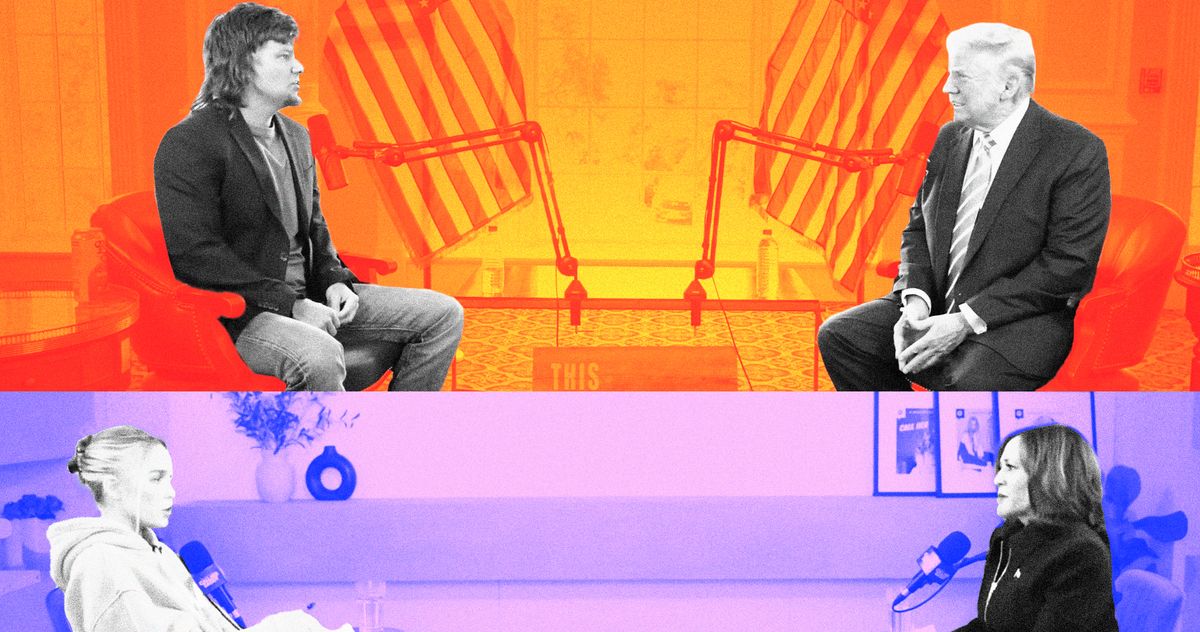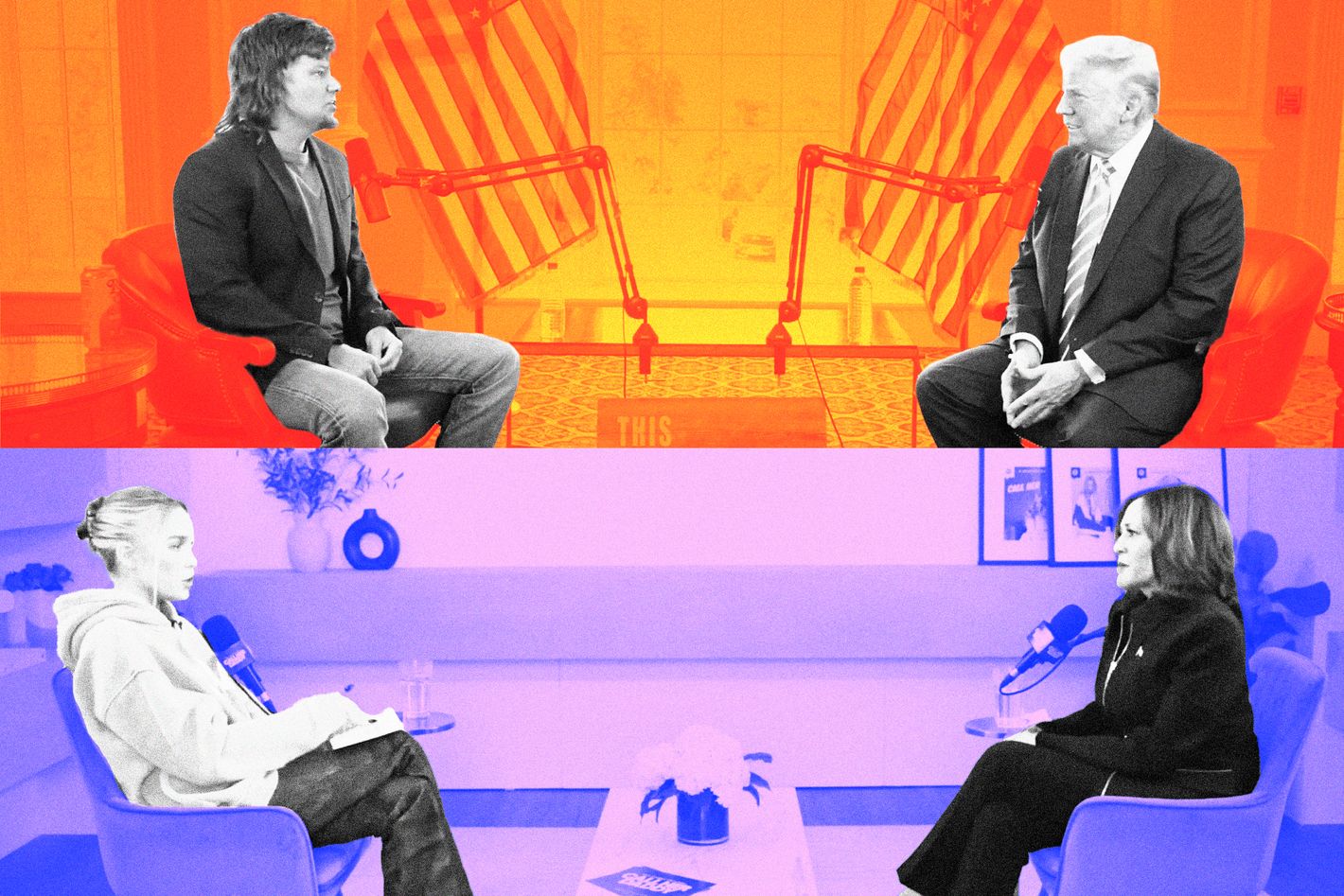‘Good’ Interviews Don’t Matter Like They Used To
Appearances on podcasts like Call Her Daddy and Theo Von’s This Past Weekend are about audience exposure more than anything else.


When Vice-President Kamala Harris stopped by Call Her Daddy as part of her campaign trail over the weekend, critics took predictable umbrage. “These are not the types of interviews that are going to press her on issues she may not want to talk about,” whinged the Politico Playbook. “Instead, expect most of these sit-downs to be a continuation of the ‘vibes’ campaign Harris has perfected.” Other people complained that Call Her Daddy host Alex Cooper wasn’t a real journalist, which, I mean, sure. But who on God’s green Earth said that Call Her Daddy is a news operation?
For the record, the interview was fine. The 45-minute spot had a clear purpose: Cooper sat down with Harris to talk about her positions on reproductive rights and had at least one semi-viral moment, when she claimed not all women want to be humble in a response to a Sarah Huckabee Sanders insult. To be sure, if you approached the interview from a journalistic standpoint, you’d have a lot to gripe about. Cooper didn’t push back much, but that’s never really been Cooper’s strong suit.
Call Her Daddy is not Harris’s only podcast stop this campaign. Last month, the vice-president went on All the Smoke, a podcast hosted by former NBA pros Matt Barnes and Stephen Jackson that has cultivated a strong following for its excellent trafficking in NBA nostalgia. Harris spoke at length about her blended family and publicly backed marijuana legalization for the first time. Though Howard Stern isn’t a podcaster, his widely listened-to SiriusXM show is still what political journalists would regard as a “nontraditional” media platform, and yesterday’s uninterrupted hour-long chat culminated with Stern’s endorsement, which should carry some weight with his broad male audience. Her running mate, Tim Walz, will soon appear on Smartless, the cozy showbiz podcast hosted by Will Arnett, Jason Bateman, and Sean Hayes, who have previously recorded an episode with Barack Obama, Bill Clinton, and Joe Biden, before Biden exited the race.
Meanwhile, Donald Trump and J.D. Vance have been frequenting the red-pill “manosphere” podcast circuit for months, hitting shows hosted by the techno-bro favorite Lex Fridman, the YouTuber turned wrestler Logan Paul, and the Joe Rogan–esque Theo Von in a bid to strengthen their support among young men. The interviews vary from galaxy-brained to brain-wormed, though I’d argue that Trump’s sit-down with Von in August produced what is arguably the most interesting candidate podcast spot this cycle. In addition to drawing out a weirdly human moment from Trump speaking about his brother’s alcoholism, Von, a breezy, free-flowing conversationalist who frequently draws from his Louisiana upbringing and experiences with sobriety, also peppered Trump with a fascinating line of questioning about what his administration would do about the raging opioid crisis. True to form, Trump responded by mostly going on a tangent about lobbyists, and Von seemed sated enough to not quite follow up. (Like Cooper, he, too, suffers from a lack of pushback.)
In any case, whether or not these interviews are “good” is beside the point. We’ve long arrived at a place where Americans, now polarized beyond recognition, prefer news sources that align with their ideology, if they even consume much news at all. This is, of course, a damning reality for the traditional news business. Journalists may want to challenge candidates, but first must secure an audience, and they are currently struggling to do this. So it makes strategic sense for both campaigns to turn to podcasts. They are merely meeting persuadable voters where they actually are. (One can clearly assume that they’re probably not among the professional political class subscribed to Politico.) In those arenas, hosts don’t care about executing “good” or challenging interviews in the classic journalistic sense. The interview just has to make sense to their audience.
In this mode, the need for pushback is less important than getting the candidate to respond to the anxieties and interests of the podcaster’s listenership. Think of the podcaster like the pastor of a church. They interpret the world for their congregants. This also means that the best way to read Harris’s Call Her Daddy episode is not really as an interview, but as a celebrity endorsement.
As tempting as it may be to assume that Cooper’s predominantly young white female audience are Harris-voter shoe-ins, they are not a monolith bloc. According to audience data obtained by NPR, the podcast’s listenership is one-half Democrats and one-half split between Republicans and independents. More interesting: a sizable portion of Cooper’s listeners live in the South. There is already a huge gender gap in the 2024 race with Harris polling far better and more consistently among women. For the Dems, then, this appearance is meant to help shore up numbers and encourage turnout, but there’s also a potential chance here to win over more women in more places at the margins. With All the Smoke, it’s not hard to see the tactical value there either: The appearance gets Harris in front of a sizable and engaged audience of Black men, a demographic that her campaign needs but probably wouldn’t be able to reach through traditional media spots.
The move to book a presidential candidate in a deeply polarized time is not without risk. For someone like Cooper, with half of her listenership split between Republicans and independents whose stances on abortion and Harris may be contestable, she was clearly aware that sitting down with Harris might draw backlash from her own audience. She kicked off the episode with what essentially amounts to a disclaimer about why she’s wading into politics at all. “As you guys know, I do not usually discuss politics or have politics on this show, because I want Call Her Daddy to be a place where everyone feels comfortable tuning in,” she says. “I’ll be honest, I have been going back and forth with this decision for a while: to get involved, or to not get involved. But at the end of the day, I can’t see a world where one of the main conversations in this election is women and I’m not a part of it.” Historically, Cooper has tended to overly accommodate her interviewees, whiffing away opportunities for follow-up questions and creating the kind of safe space that makes A-list celebs comfortable. As her platform has grown, it’s been hard not to feel like she hasn’t capitalized on her growing influence. The Harris appearance marks a real change. In other words, she seems to finally be doing something with her fame.
That risk has since been realized. In the comments section of her various social-media spots, some people decry the episode to be little more than “Democratic propaganda.” Of course, it’s hard to tell with these things what complaints are levied in bad faith and what is not, who are bots and who are real. And while it remains to be seen whether Call Her Daddy will be materially impacted by this apparent backlash, the aftermath nevertheless underscores the tricky nature of Cooper’s position. Like any pastor of a church, she still has to grapple with the different wings of her congregation.
That Harris has largely evaded the traditionally contentious press is, of course, genuinely concerning. After all, you do want a potential president to be sufficiently challenged on substantive policy, and what does it say about the candidate running on the strength of democracy to somewhat anti-democratically avoid the mainstream press? To be fair, there have been signs that the campaign has been shifting gears of late, with Harris also making an appearance on 60 Minutes earlier this week. Meanwhile, the Trump campaign pulled out of its own 60 Minutes spot and continues to disproportionately duck away from any media accountability altogether. But the fact that both presidential candidates are increasingly turning to big podcasts illustrates how they are now very present as a force in elections. The interviews might be soft, but the endorsements are real.
Related








